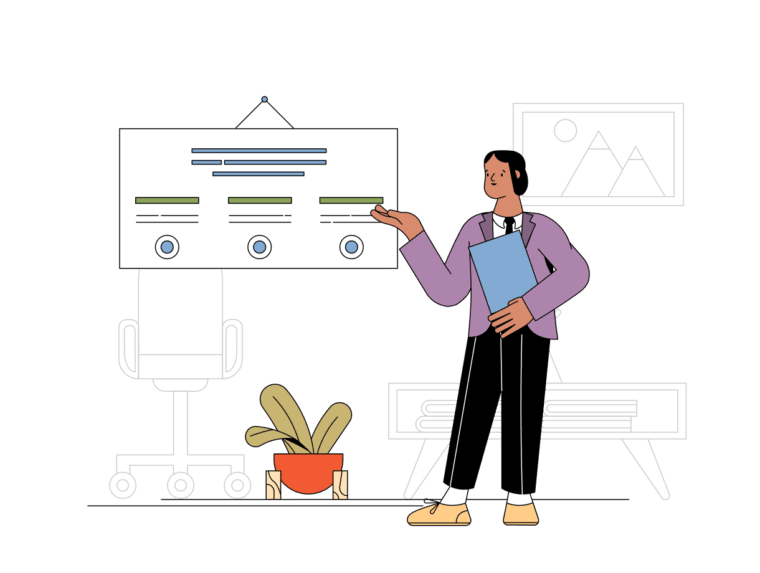The big day is finally here! You’re anxious and feeling stressed. You’re not alone. There are not one or two job applicants that are having feelings of anxiety, especially when the thought of interview questions come to mind. They’re worried about uttering the wrong words or rambling and concerned of not being able to answer the questions being asked from them.
In this article, I’m talking about interview preparation tips, best interview questions, and common mistakes during the interview.
Sample Interview Questions and Answers
“Tell me something about yourself.”
A question about yourself is the first thing you will need to answer. Always remember that this question seeks answers from you so that the interviewer can better understand all the qualifications written and listed on your resume. Describe your work background, highlight your responsibilities and previous work achievements, and how you could bring and use those experiences as you transition to your new role in their company.
“Where do you see yourself in five years?”
Employers want to hold on to talented and the best candidates for as long as possible, and hearing your answers to this question can let them gauge whether you are in it for the long haul. You can answer this question with the most confidence or the utmost humility. “I see myself working right here for your office!” or “Somewhere where I could do a great job and where my talents are nurtured and developed.” Highlight skills you would like to develop and dreams of future business and projects if you have them.
“Why should we hire you?”
This is a question for you to answer by expressing your passion and all your desires and commitments to make yourself stand out from the pool of applicants. A question that is usually asked by the end of the interview, so make sure to highlight other things you have not been able to touch on, like exceptional skills and other soft skills that could contribute to your work and role. Highlight skills that are written in the job role when you read about this job and relate them to all your background and skills.

“How did you find this job?”
Respond to this question by making working exactly right there, in their company or office, the focal point of your answer. Maybe you have heard this posting from one of your networks, or you have been following the company’s listing and jumped right on when the opportunity to apply for a vacant position was made available. Make sure that you emphasize that you would love to work for the company and not just jump on any available jobs.
“Why are you leaving your current job?”
Answer this question thoughtfully with your eyes looking at the future. Focus on what you could gain in the new role, how you can develop your skills further, and how the work you are applying for can help meet that end. Keep it positive and focus on your skills instead of the negative aspects of leaving your current position.
“What is your biggest professional achievement?”
Sharing achievements relevant to the job is integral in answering this interview question. This question lets the interviewer imagine you assuming the role you are applying for by hearing stories about you solving previous work problems, with you emphasizing what the problem was and what you did to remedy it. If you are a writer or an artist, play up published works, or highlight excellent reports that gave your previous company gains if you work in finance or logistics.
“Tell me about a difficult work situation, and how did you manage it?”
As the applicant and knowing how well you perform your roles even under pressure is the goal in asking this question. To answer cohesively, remember the STAR method where you first highlight the Situation, then the Task or what was needed for you to do, third is the Action and how you overcame the job, and the last is telling about the Result and what you learn from the adversity. Convey emotion in this question by telling a story and not just stating figures and facts about the work scenario.
“Tell me about your salary range expectations.”
This question is asked of the applicants for the interviewer to assess whether their expectations align with the budget they have allocated for the role. There are three ways to answer this question. The first one is providing your range upright, the second is including the negotiation options, and the third is deflecting the question. The third one is usually the way to go because by asking more about your roles, you can provide an accurate expectation and answer coupled with researching in advance.
“Tell me something about your work experience.”
Here is another question to expound on what is written on your resume. Feature all your skills and previous job roles and responsibilities that are transferable and could benefit the job you are applying for. Take note to quantify the length of experience in a particular skill, especially if you have considerable ones, and it is also essential to connect all your skills and experience to the job roles and responsibilities.
“Can you work under pressure?”
The ability to work under pressure, whether from a tasking job like finance or jobs requiring steep deadlines like working for a publication, is a requirement in most positions. The STAR method of answering questions can also guide you in responding to this query. Highlighting previous work scenarios where thinking logically amidst panic is important and can be an asset in a fast-paced work environment.
You Might Also Like: Why Use An Employment Recruiter To Land Your Dream Job
“What about the job appeals to you the most?”
In answering this question, negative answers about your previous work are usually deemed unprofessional. So, instead, focus on the positive by communicating your hope of growing into the role you are applying for and how you could not wait to learn the skills the company will further develop or teach you. Introspections about how the position will help you further with your career or life goals also answer such questions.
“Do you have any further questions?”
Probably the last question the interviewer will have the chance to ask you and one of the most important ones. Take the opportunity to learn more about the role, the company, and even the company’s work culture by asking questions. Ask intelligent questions that would show your enthusiasm and inquiries to determine whether this role and the company’s goal align with your own. Questions about the challenges for your position, what a typical day for your post looks like, and others.
Tips to Prepare for a Job Interview
Aside from preparing for the best interview questions, you also need to prepare for the job interview itself. Check out the following for useful tips.

Know Who You are Applying To and the Industry it Belongs
Job interviewers want the best possible person to help their business grow and outlast the competition. That is why many HR professionals assess candidates’ knowledge of the company they are applying to and the industry it belongs to. They will want to know if you can be instrumental in advancing their aims in the industry.
It makes sense to research the business organization you want to join, including its competition and competitive advantages. It would be wise to study the company’s position in the industry and its contributions to advancing industry ideals.
Analyze the Job Description and the Competencies the Employer Expects
Read the job post several times to understand what the work entails. Some employers have very detailed job descriptions, including professional qualifications, competencies, skills, and other work performance-related expectations. Other companies might only give you a general idea of the job’s scope and responsibilities.
Take out the key points in the job description, and make a list. Tick those items you know you have and cross out deficiencies. If you have more minuses than pluses, you might want to reconsider your application. However, if you have most of the requirements, you can build on those qualities as unique selling points.
Reflect on Why You Want the Job and List Unique Selling Points
Some candidates do not think hard about why they want the job. It is often enough for them to get out of their homes and belong to the employed sector. Unfortunately, job interviewers have very sensitive ‘human radars’ that can detect if a candidate’s interest in the job is genuine or not.
Hence, it would be best to consider your unique selling points and build on them as your strengths. Try to develop each one and weave it into real-life experiences that highlight your abilities. It also matters to know beforehand what interests you about applying for the job and what work-related rewards you find valuable.
Prepare Answers to Common Job Interview Questions and Practice Them
Job interviewers have a set of questions they dish out to almost every applicant they entertain. You can find these questions on online resources and books. Although the interviewer might not use the questions in their exact phrasing, your knowledge of these queries can help you nail the interview and get the job you want.
It would be pointless to consider all questions and prepare answers for them. You will only give yourself a terrible headache if you do that. Instead, pick the questions you think will most likely come out during the interview. You can ask recent hires or friends about their interview questions to help you prepare. At least, you will not fumble when the job interviewer decides to dish them out.

Anticipate Potential Interviewer Reservations and Concerns
Hundreds of candidates might apply for only a few slots, making competition fierce. It is often insufficient to have good education and experience because almost everyone will have those qualities. It is worth remembering that the job post specifies the minimum requirements. Hence, job interviewers will want to screen every applicant they meet.
It often helps to put yourself in the interviewer’s shoes. Why would you hire a person like yourself, and why not others? Conversely, why should you not hire you? Interviewers will always have reservations or concerns about the person they are interviewing. It makes sense to prepare for these issues by offering a credible defense.
Prepare Questions for the Job Interviewer
Some people might find it odd to ask the interviewer, even repulsive. However, HR professionals appreciate candidates who have the guts to ask the right questions that showcase their understanding of the company, its industry position, and the requirements of the job. It shows serious intent, which employers want.
Unfortunately, it would be best to be cautious in framing your questions. You might want to phrase your queries in the form of a hypothetical scenario. For example, you might want to ask the interviewer what she believes the ideal candidate for the position should be. Under no circumstance should your answer be “no, not really” when the interviewer asks you if you have any questions.
Strive to Make a Good First Impression within the First Five Minutes of the Interview
Studies show a striking correlation between selection decisions and first impressions. A meta-analysis confirms the general observation that job interviewers only need a few pieces of information to form an accurate assessment of candidates.
These scholarly endeavors also describe an inverse relationship between conclusion validity and interview length. It concludes that the shorter the interview, the more accurate the impressions.
Unsurprisingly, many job interviewers form their selection decisions within the first five minutes of an interview. Hence, it would be best to put your best in this crucial period to get the best possible outcome.
Entering the interview room with enthusiasm and energy can help. Expressing your appreciation for the job interviewer’s effort and time also matters. If you want to make a lasting positive first impression, it would be best to start the interview by showing genuine excitement and interest about the prospect of working in the company.
Interview Tips: Common Job Interview Mistakes and Fixes
Besides the common interview questions, be aware of the common mistakes that people commit when in an interview. In the following I am discussing some of them (with fixes).
Arriving at the wrong time
Arriving at the wrong time can have a lot of implications for your boss. They say that time is gold, and this holds very true in interviews.
Being too early is beneficial, but it can also be disadvantageous on your part. Time spent waiting outside can be useful in building self-confidence by practicing your lines and introductions.
Arriving late has a lot of negative implications. This may impose how you are not very interested in the job, or that you are downplaying the interview.
Compared to being late, being early is a whole lot better. But being on time can mean so much for the interviewer. It shows how you value their time and how you want to engage with the interviewer to get their approval.
The fix is to double-check the schedule the day before and arrive on time. It is best to arrive 10 to 15 minutes before the interview starts. This way, you won’t put pressure on the interviewer, and you can have enough time to feel comfortable in the place.
Dressing inappropriately
Most people prepare a lot for interviews with what they’re going to say and how they’re going to express themselves. More often than not, they tend to prepare for what they’re going to wear the night or a few hours before the interview process.
Dressing inappropriately is a common interview mistake. People sometimes come in wrinkled clothes or rumpled formal wear. Some also dress excessively.
Put your best foot forward with a polished outfit. Prepare what you are going to wear a day or two before the interview day. Remember to iron out your clothes, and match your accessories.
The focus will still be on you, without distracting the interviewer with an unsophisticated outfit.
Being unprepared
Going on an interview unprepared is going on a battle without anything at hand. Being unprepared is one of the biggest turn-offs for interviewers.
If you can’t express your thoughts on the role or position you aspire to in the company, it may give an impression of how you didn’t prepare nor anticipate anything for the company.
Read up about the company’s goals and vision. Know the basics and prepare the common questions for their interviewees. Luck favors those who are prepared after all.
Not being confident
One of the things that turn on interviewers is confident aspirants. They love to interview those who are capable of bringing themselves up without being too full of themselves.
Being anxious a day or hours before the interview process is quite normal. But being too jittery and displaying too much fear and anxiety over common questions can be a disappointment to some interviewers.
Practice saying a few lines before the interview. Smile from time to time, and display confidence as they ask about you, your past performance, and others.
Talking too much about yourself
There is a fine line between being confident and being too self-centered. Some people tend to forget that the interview is not about them, but what in them can help the company.
Talk about your strengths and the skills that can contribute to the company’s growth. Shy away from discussing personal stories that are much unrelated to what the interviewer is asking about.
Don’t talk about yourself, but rather discuss what you can do to make the company take pride to have you.
Using your phone a lot
Being distracted with your phone can have bad implications for the interview. It shows that you are not interested and that something on your phone is worth more than the interview process.
Interviewers are keen on body language. Using your phone, glancing at other electronic devices, and even checking the time can distract the interviewer.
Make sure to keep your phone in silent mode, and turn notifications off until the interview is over. Make sure you have and know everything beforehand, so you won’t have to constantly check your phone for other information
Not paying attention
Listening is just as essential as talking. Not paying attention to what the interviewer is asking, or not listening to the questions intently can leave out a bad impression.
Most don’t pay attention to what the interviewer wants. It is pertinent to give what the interviewer is asking about, so you need to pay attention to every question or statement they give off.
Keep up with what the interviewer is saying, and make sure to pay attention to everything they say and ask for. Maintain eye contact and be focused all the time.
Not showing much interest or having low energy
Another thing that disappoints interviewers is how some people display low energy on the day of the interview. When people are not enthusiastic about the questions, it implies how they are not eager to learn more about the position and the company itself.
Being sleepy is also a sign of low energy. Preparing yourself for good sleep is a sign that you value the company’s events like the interview.
Make sure to have enough sleep before the day of the interview. If you need to drink a cup of coffee, ensure to drink a few hours before.
Badmouthing past employers
The interviewer may ask about your past employers. Some people tend to badmouth their past employers and explain why they left.
Sharing your past experiences can be intriguing to some interviewers. However, badmouthing other companies can imply that you might share bad impressions on their company as well.
When they ask about your past employers, keep your answers brief and to the point. Be objective, and separate your issues.

Not asking questions
Employers allow a short time for your questions when the interview is about to end. At this point, they want to know how you can handle conversations by asking questions.
Being curious shows you want to get to know the company more. It also implies that you care about the company’s rules, programs, and welfare.
Ask out what you want to know about – their rules, the company’s culture, and your potential in growing with the company. There are a lot of standby questions you can use, and you can prepare these questions a day or two before.
There you have the best interview questions to prepare for as well as the tips and common mistakes in job interviews. Prepare and do your homework before the big day, rehearse answers to common questions, and have confidence in yourself. YOU CAN DO IT!
